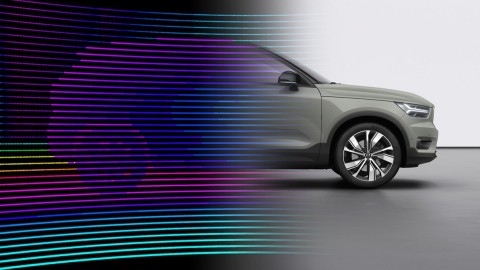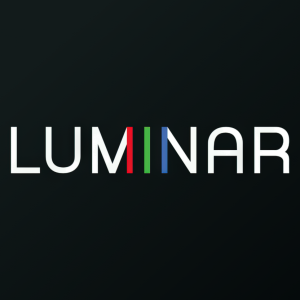Luminar and Volvo Cars Further Collaboration with Release of Comprehensive Lidar Dataset
Luminar Technologies (Nasdaq: LAZR) and Volvo Cars introduced the Cirrus dataset, featuring high-performance lidar data from Volvo's testing fleet. This dataset aims to enhance research and development for safe autonomous driving, providing long-range object detection capabilities up to 250 meters.
It improves on traditional lidar datasets by utilizing dynamically adjusted scan patterns, delivering higher resolution data. The collaboration underscores a commitment to advancing autonomous vehicle safety and is supported by Duke University’s Pratt School of Engineering.
- Launch of a unique Cirrus dataset to aid in autonomous driving research.
- Collaboration with Volvo Cars enhances market presence and credibility.
- Dataset features advanced lidar capabilities with long-range detection (250 meters).
- None.
Luminar Technologies, Inc. (“Luminar”) (Nasdaq: LAZR), the global leader in automotive lidar hardware and software technology, and Volvo Cars today released a curated dataset called Cirrus containing unique long range lidar data from Volvo Cars’ test and data collection fleet. This curated dataset is being opened to industry developers and researchers in order to aid and further advancements for safe self-driving.

(Photo: Business Wire)
Cirrus features raw data from Luminar’s high performance lidar sensors, which accurately detect objects ahead of the car out to 250 meters away. The dataset is intended to help advance research and refinement of self-driving software algorithms, in the interest of improved vehicle safety at highway speeds and in complex environments. Duke University’s Pratt School of Engineering has also been contributing effort to the project.
To date, lidar research has relied on shorter range, lower resolution point clouds and uniform scanning patterns in public datasets. Luminar also has the unique capability of dynamically adjusting its scan pattern for optimized resolution up to 5x standard uniform distribution. This is reflected in the dataset, which also includes uniform lidar data and corresponding camera images, and annotations for reference.
“Making this substantial dataset publicly available with Volvo Cars represents another significant step towards the development of safe and ubiquitous autonomous vehicles,” said Christoph Schroeder, vice president of software at Luminar. “Luminar and Volvo Cars are aligned in the belief that sharing knowledge and research will contribute to safer roads for everyone. Our dataset uses non-uniform gaussian scanning patterns, giving developers extremely high-quality information to help build more advanced autonomous capabilities.”
The Cirrus dataset is being released as part of the new Volvo Cars Innovation Portal, which makes a broad variety of resources and tools available for free, allowing external developers to create new innovative services and in-car apps.
“By making these resources publicly available, we support developers in and outside our company, and collaborate with the best of the best in their fields,” said Henrik Green, chief technology officer at Volvo Cars.
About Luminar Technologies
Luminar is an autonomous vehicle sensor and software company with the vision to make autonomy safe and ubiquitous by delivering the only lidar and associated software that meets the industry’s stringent performance, safety, and economic requirements. Luminar has rapidly gained over 50 industry partners, including 7 of the top 10 global automotive OEMs. Earlier this year, Luminar signed the industry’s first production deal for autonomous consumer vehicles with Volvo Cars, while also recently striking deals with Daimler Truck AG and Intel’s Mobileye. Luminar has also received minority investments from the world’s largest commercial vehicle manufacturer, Daimler Truck AG, and Volvo Cars, a global leader in automotive safety, to accelerate the introduction of autonomous trucks and cars at highway speed. Founded in 2012, Luminar is a 350-person team with offices in Palo Alto, Orlando, Colorado Springs, Detroit, and Munich. For more information please visit www.luminartech.com.
Forward Looking Statements
This press release includes forward-looking statements. These statements are made under the “safe harbor” provisions of the U.S. Private Securities Litigation Reform Act of 1995. Forward-looking statements include statements about the expected timing of the launch of production solutions and information concerning Luminar’s possible or assumed future results of operations, business strategies and the expected development, capabilities and timing of the offering of Luminar’s products and services. These statements may be identified by words such as “will,” “future”, “towards,” “feel,” “believes,” expects,” “estimates,” “accelerating,” “projects,” “intends,” “should,” “is to be,” or the negative of such terms, or other comparable terminology. Forward-looking statements are statements that are not historical facts and are based on Luminar’s management’s current expectations, estimates, projections and beliefs, as well as a number of assumptions concerning future events. Such forward-looking statements are not guarantees of future performance, conditions or results, and are subject to risks and uncertainties, assumptions and other important factors, many of which are outside Luminar’s management’s control and which could cause actual results to differ materially from the forward-looking statements contained herein due to many factors, including, but not limited to: Luminar’s limited operating history; Luminar’s inability to reduce and control the cost of the inputs on which Luminar relies; Luminar’s ability to transition to an outsourced manufacturing business model; the success of Luminar’s customers in developing and commercializing products using Luminar’s solutions; Luminar’s ability to protect its intellectual property rights; whether Luminar’s lidar products are selected for inclusion in autonomous driving or ADAS systems by automotive OEMs or their suppliers; changes in personnel and availability of qualified personnel; the amount and timing of future sales; whether the complexity of Luminar’s products results in undetected defects and reliability issues which could reduce market adoption of its new products, damage its reputation and expose Luminar to product liability and other claims; strict government regulation that is subject to amendment, repeal or new interpretation and Luminar’s ability to comply with modified or new laws and regulations applying to its business; general economic uncertainty and the effect of general economic conditions on Luminar’s industry in particular, including the level of demand and financial performance of the autonomous vehicle industry and market adoption of lidar; the effects of the ongoing coronavirus (COVID-19) pandemic or other infectious diseases, health epidemics, pandemics and natural disasters on Luminar’s business; and those factors discussed in Luminar’s registration statement on Form S-1 and amendments thereto (No. 333-251657) under the heading “Risk Factors,” filed with the Securities and Exchange Commission. You are cautioned not to place undue reliance upon any forward-looking statements, which speak only as of the date made and Luminar undertakes no obligation to update any forward-looking statement to reflect events or circumstances after the date of this press release.
View source version on businesswire.com: https://www.businesswire.com/news/home/20210129005125/en/
FAQ
What is the Cirrus dataset released by Luminar Technologies and Volvo Cars?
How far can Luminar's lidar sensors detect objects?
What is the significance of the Cirrus dataset for the autonomous driving industry?
When was the Cirrus dataset announced?







